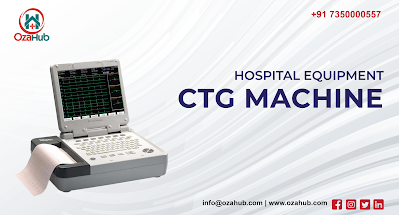How is the process of cardiotocography carried out?
Cardiotocography is usually called a 'CTG' by medics and nurses. It can be expended to display a baby's heart degree and a mother's shrinkages during lying-in. A typical Cardiotocography (CTG) examination is done on apparatus made by CTG Machine Manufacturers which methods a baby's heart proportion. At the identical time, it also screens the reductions in the womb (uterus). CTG is expended both before natal (antenatally) and during childbirth, to screen the baby for any cyphers of anguish. By observing numerous diverse features of the baby's heart degree, medics and nurses can see how the baby is managing. CTG is most usually supported out outwardly. This means that the apparatus expended to monitor the baby's heart is placed arranged in the stomach (belly) of the mother. An adaptable girdle is located around the mother's stomach. It has two round, level plates about the scope of a tennis orb which makes the connection with the skin. One of these plates gages the baby's heart degree. The other evaluates the pressure on the stomach. This method can display when each shrinkage occurs and an approximation of how robust it is. The nurses may put some gel on the skin to help get a sturdy indication.
The CTG belt supplied by the CTG Machine Suppliers is linked to a
contraption that understands the indication coming from the plates. The baby's
heart degree can be perceived as a thrashing or throbbing noise that the
contraption yields. Some mothers can find this off-putting or perturbing but it
is likely to turn the tome down if the sound troubles you. The apparatus also
delivers a printout that displays the baby's heart degree over a definite
period. It also displays how the heart degree changes with your shrinkages. If
you have CTG beforehand you are in childbirth you may be requested to press a
key on the mechanism every spells the baby transfers. At this while, you will
not be having any shrinkages so the CTG will only screen the baby's heart
degree.
Infrequently during labour childbirth, if a
sign can't be realized using the outward screen, or when observing is more
vital, inner observing can be used. For inner observing, a minor, reedy
expedient called an anode is used. This is introduced through the vagina and
neckline of the womb (which will be unlocked during labour childbirth) and
positioned on the baby's scalp. This expedient annal the baby's heart degree.
Furthermore, inner observing can only be used when the baby is going to be
conveyed head first. Inner observing will not work on a breech (end or foot
first) exhibition. CTG machines use resonance surfs called ultrasound to notice
the baby's heart degree. Ultrasound is a high-frequency hum that you cannot
catch but it can be directed out (produced) and noticed by singular machines
made by CTG Machine Manufacturers.
Ultrasound voyages easily through the liquid
and soft skins. Though, ultrasound recoils back as 'echoes' (it is echoed back)
when it hits a more rock-hard exterior. For instance, the ultrasound will
voyage easily through blood in a heart cavity. But, when it hits a hard faucet,
a lot of the ultrasound ricochets back. Consequently, as ultrasound 'hits'
diverse erections in the form, of different thicknesses, it directs back
resonances of variable strength. In CTG observing, a distinct kind of
ultrasound, called Doppler®, is expended. This kind of ultrasound is used to
amount edifices that are progressing, making it valuable for observing heart
degree. If you are looking for CTG Machine Dealers, please log onto Ozahub.




Comments
Post a Comment